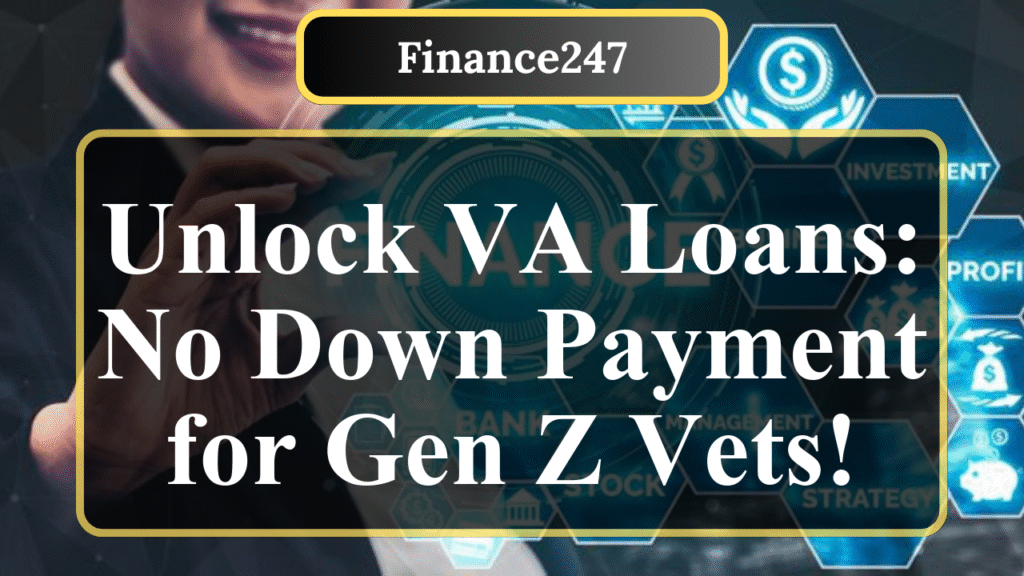Gen Z veterans can leverage VA loans to achieve homeownership with no down payment and competitive rates. This guide explains eligibility, loan types, and benefits, addressing financial challenges unique to young veterans. Learn how to navigate the process, avoid scams, and use VA resources for smarter financial decisions.
Understanding VA Loans for Gen Z Veterans
VA loans, backed by the U.S. Department of Veterans Affairs, offer a powerful path to homeownership for Gen Z veterans, who are increasingly transitioning from military service to civilian life. These loans provide unique benefits like no down payment, no private mortgage insurance (PMI), and competitive interest rates, making them ideal for young veterans with limited savings. Here’s a comprehensive breakdown to help Gen Z veterans understand and maximize this benefit.
Eligibility Requirements
To qualify for a VA loan, Gen Z veterans must meet specific service criteria. Typically, you need at least 90 continuous days of active-duty service if discharged under qualifying conditions, or 181 days during peacetime. National Guard or Reserve members may qualify after 90 days of active service, including at least 30 consecutive days under Title 32. A Certificate of Eligibility (COE) is required to prove eligibility, which can be obtained online through the VA’s eBenefits portal or via a lender. Lenders also assess credit and income, but VA loans have more lenient credit requirements, often accepting scores as low as 620, though some lenders may require higher.
Types of VA Loans
VA loans come in several forms tailored to different needs:
Purchase Loans: These allow veterans to buy, build, or improve a home with no down payment and lower closing costs. You can borrow up to the Fannie Mae/Freddie Mac loan limit (currently $766,550 in most areas, higher in high-cost counties) without a down payment.
Interest Rate Reduction Refinance Loan (IRRRL): For veterans with an existing VA loan, this “streamline” refinance lowers interest rates and monthly payments with minimal paperwork.
Cash-Out Refinance: This lets veterans refinance an existing mortgage (VA or non-VA) and access home equity as cash, up to 90% of the home’s value, for expenses like debt consolidation or renovations.
Native American Direct Loan (NADL): Designed for Native American veterans, this loan finances homes on federal trust land, offering low or no down payment options.
VA Renovation Loans: These cover home purchases or refinances while financing approved repairs, ideal for fixer-uppers.
Key Benefits for Gen Z Veterans
VA loans stand out for their financial advantages. No down payment is a game-changer for young veterans who may struggle to save due to frequent relocations or entry-level civilian salaries. The absence of PMI saves hundreds monthly compared to conventional loans, which require PMI for down payments under 20%. Competitive interest rates, often lower than conventional or FHA loans, further reduce costs. Additionally, VA loans have no prepayment penalties, allowing veterans to pay off loans early without fees. The VA also offers foreclosure avoidance assistance, providing financial counseling to prevent default, which is critical for Gen Z navigating economic uncertainties.
Navigating Financial Challenges
Gen Z veterans, often in their early 20s, face unique financial hurdles. Transitioning to civilian life can mean temporary income gaps, with 27% of young veterans reporting debt delinquency within their first year post-service, particularly on auto loans and credit cards. VA loans mitigate this by requiring no down payment and offering relaxed credit standards. However, veterans with defaulted federal student loans may face barriers, as such defaults can disqualify them from VA loans until resolved. Contacting a VA loan technician at 877-827-3702 can provide personalized guidance on addressing these issues.
Application Process
Start by obtaining your COE, which confirms your eligibility. Next, get prequalified with a VA-approved lender to estimate your borrowing power based on income, credit, and debt-to-income (DTI) ratio (ideally 36% or lower, though some lenders allow up to 50%). Preapproval, a more in-depth step, strengthens your position when making offers on homes. Lenders like Veterans United or Navy Federal Credit Union specialize in VA loans and can streamline the process. Once approved, you’ll need to pay a VA funding fee (0.5% to 3.3% of the loan amount), though disabled veterans receiving compensation are exempt.
Avoiding Scams and Missteps
Scammers often target veterans, posing as VA affiliates to steal personal information or push fraudulent loan offers. The Consumer Financial Protection Bureau warns against unsolicited calls or emails claiming VA affiliation. Verify any contact by calling the VA directly at 1-800-827-1000. Additionally, some lenders may not fully understand VA loans, leading to misinformation. Work with VA-specialized lenders to ensure accurate guidance.
Financial Literacy Resources
The VA offers tools like budget worksheets, savings calculators, and financial counseling through the National Veterans Financial Resource Center (FINVET). These resources help Gen Z veterans manage debt, create budgets, and avoid predatory lending, which is prevalent near military bases. The Department of Defense’s Financial Readiness Network also provides money management tips tailored to military life cycles.
Maximizing Your VA Loan
To make the most of your VA loan, compare offers from multiple lenders, as rates and fees vary. Use the VA’s online resources to understand loan limits and terms. For Gen Z veterans eyeing long-term financial stability, VA loans can be reused after selling a home or paying off a prior loan, offering flexibility for future moves. Consulting a financial advisor or VA loan specialist can help tailor the loan to your goals, whether it’s buying a starter home or investing in a fixer-upper.
Disclaimer: This article is for informational purposes only and does not constitute financial advice. Consult a certified financial advisor or VA loan specialist for personalized guidance. Information is sourced from VA.gov, Veterans United, Investopedia, and other reputable financial resources.


